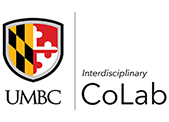Title:
Amazing Stories: Investigating The Coslet-Sapienza Fantasy and Science Fiction Fanzine Collection
Project description:
The interdisciplinary team of researchers will examine the UMBC’s Special Collections’ vast science fiction resources, focusing specifically on fanzines, in order to explore various themes including identity, community, consumption, labor, and the politics of alternative culture. Based on this research, the team will produce a website, housed on the Special Collections’ homepage, presenting an overview of the collection’s value, along with four to six original short research essays.
Sponsor description:
The Special Collections department collects materials of enduring historical and cultural value — housing, preserving, and making accessible materials that are original, rare, unique, fragile, and archival. Our collections and staff support UMBC’s research and educational mission and its dedication to cultural and ethnic diversity, social responsibility and lifelong learning. Our diverse collections include a wide variety of formats such as rare books, photographs, manuscripts, archives, audio and visual recordings, digital items and artifacts. They are available for research use on site by faculty, students, staff, visiting scholars, and the general public. The Special Collections holds various collections dedicated to science fiction and fantasy. Our researchers have opportunities to study many different formats, including books, literary manuscripts, personal papers, major holdings of fanzines and pulp magazines, comic books, posters, and artwork. The individuals in Special Collections helping to facilitate this project are Acting Director and Curator, Lindsey Loeper, and Special Collections Librarian, Susan Graham.
Project goals:
Students will begin the project by exploring the science fiction zine collection while reading excerpts from Stephen Duncombe’s Notes From Underground: Zines and the Politics of Alternative Culture. Collaboratively the team will produce two short essays during the first two weeks that present an overview of the collection, and highlighting the historical context surrounding zine culture. Students will then identify individual research interests within the collection, each producing an additional essay by the end of the four weeks. The team will learn the online publishing tool utilized by Special Collections (Omeka, or a similar platform), organizing the material into an interactive website.
Public component:
The project’s goal is to create research content to be featured on a publicly available website housed on the library’s Special Collections page. One audience for this project is our larger UMBC community. Special Collections provides students with the opportunity to work with primary resources on campus. Students can utilize the collections for term research projects, or as a focus for an undergraduate research proposal for an Undergraduate Research Award (URA) or an URCAD presentation. Beyond the reach of the campus, the project also aims to highlight the value of the collections to the larger Baltimore area science fiction community. The Baltimore Science Fiction Society (BSFS) promotes the appreciation and creation of science fiction throughout the region, publishing an annual fanzine, and hosting a yearly event, Balticon. While this proposal is not promoting a formal relationship with the BSFS, the project leader is planning on pursuing an informal one. This relationship could include an essay hosted on the project website highlighting the BSFS’ zine, hosting an event featuring an individual from the BSFS along with the unveiling of the completed project, and possibly having our team visit the BSFS to examine their collection and discuss the historical importance of zines.
Skills and resources required to complete the project:
Student members of the interdisciplinary team should share the following traits: intellectual curiosity, strong written and oral communication skills, leadership ability, and solid research skills. At least one of the students should have website design knowledge. Students will be trained to use Omeka, which is an online platform for library special collections, or a similar online exhibit platform. If the project is able to establish a partnership with the BSFS, the team would utilize financial support for a small honorarium paid to a speaker, and/or transportation costs for our students to visit their offices in Baltimore.
Project leader recommendation:
Donald Snyder, Media and Communication Studies.
Budget (include both funds brought to the project and funds required):
$500-700 to cover an honorarium, travel, and catering at an event connecting the project to The Baltimore Science Fiction Society.
